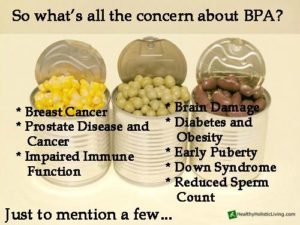
The Serious Dangers of BPA The canned-food chemical bisphenol A, or BPA, has been under attack for years, with studies suggesting it’s associated with negative health impacts ranging from cancer and obesity to infertility and heart disease.
BPA is a common hormone-disrupting chemical used as a liner in metal food and drink cans and in cash-register receipts.
A new study published in the Proceedings of the National Academy of Sciences is strengthening the push to ban BPA, showing that levels found in most Americans is increasing breast cancer risk in monkeys, a close relative of humans.
“These findings strongly suggests that BPA is a breast carcinogen in humans, and human exposure to BPA should be curtailed,” says study coauthor Ana M. Soto, MD, professor of anatomy and cell biology at Tufts University School of Medicine in Boston.
A pregnant monkeys’ low-level exposure caused abnormal changes in the offspring’s breast tissue. The offspring’s mammary glands were denser, one of the leading risk factors in breast cancer.
BPA is chemically related to diethylstilbestrol, an estrogen that increases the risk of breast cancer in both rodents and in women exposed in the womb. BPA is an estrogen, and estrogens are considered carcinogens.
Research on BPA and breast cancer risk involves fetal exposure and cancer that develops decades later. A study published in the journal Circulation showed a direct link between high BPA exposure in healthy adults and greater risk of developing heart disease. BPA overrides the female body’s natural heartbeat signaling causing arrhythmia (erratic beating that could cause sudden cardiac death) in heart tissue testing.
No matter what your age, and regardless of your desire to become pregnant, it’s in everyone’s best interest to reduce BPA exposure.
The Food and Drug Administration was sued and forced to consider a BPA ban in food packaging, but said earlier this year it needed more time to determine whether the chemical threatens human health.
A few companies say they are planning to move away from use of BPA in canned goods, including Campbell’s Soup. Some canned food companies, like Eden Foods, have already removed BPA from cans and named the replacement. Campbell’s, however, isn’t naming the replacement chemical or saying when the BPA ban will go into effect. Some researchers fear BPA replacement chemicals could be just as bad—or worse—than BPA.
Avoiding canned food and drinks is a great way to reduce BPA exposure, but because the chemical is produced in heavy volumes and used in so many products, many public health experts believe government needs to intervene to cut back on this toxic exposure.
If we try to decrease our exposure to BPA by reducing the use of plastics and canned food, and avoiding to touch credit card receipts, there’s no way of knowing if we’ve reduced exposure by 5 percent or 95 percent; thus, what we need is regulatory action to decrease human exposure to BPA.
